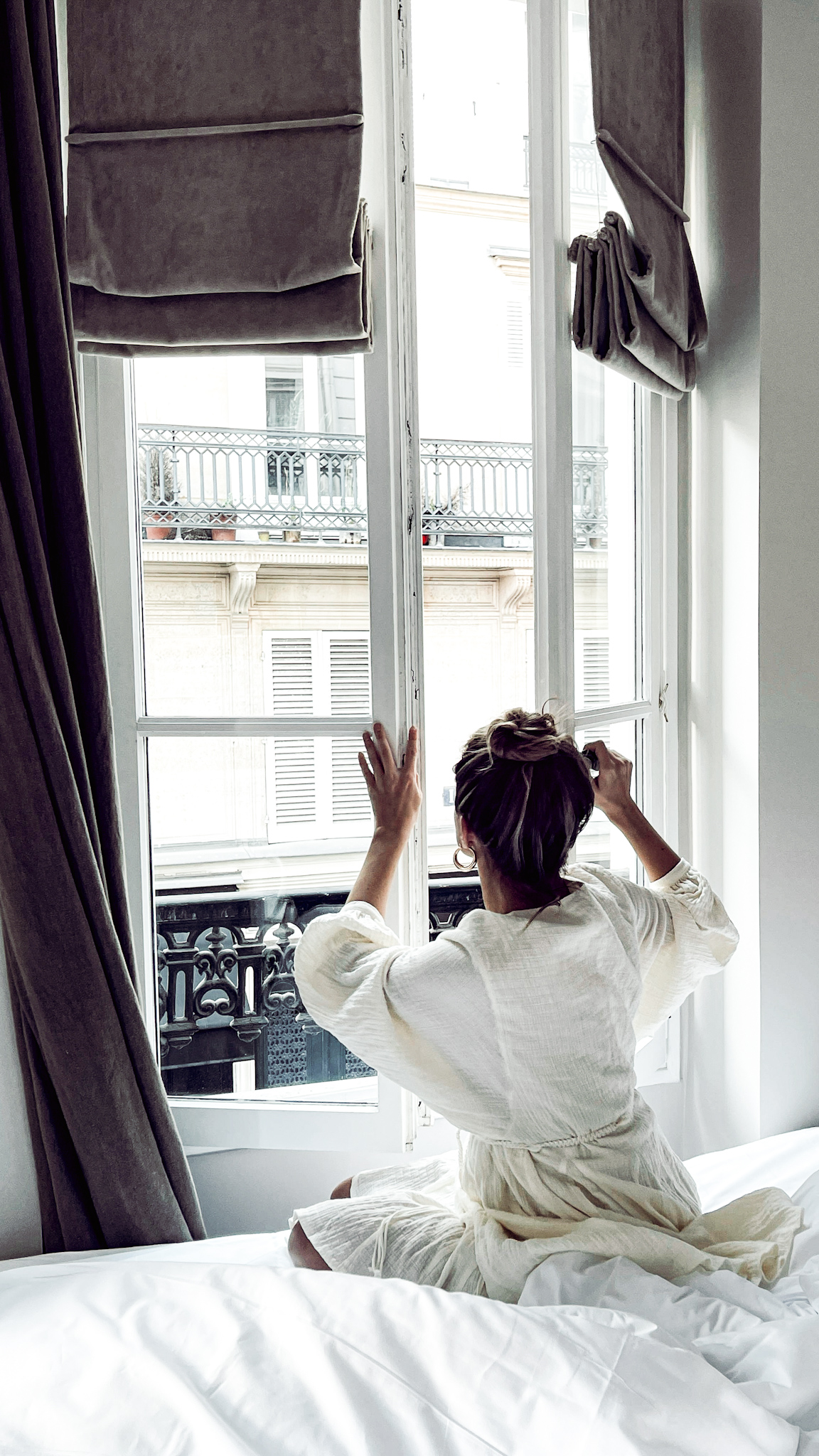How to Break the Cycle of Morning Anxiety

This post may contain affiliate links, which means I may earn a small commission if you make a purchase through these links — at no extra cost to you. Thank you for supporting the content I create here on the blog! You can read my full Disclosure Policy for more details.
In this article
There’s a kind of anxiety that doesn’t wait for bad news. It greets you before your alarm even rings — that wave of tightness in your chest, the quickened heartbeat, the sense that you’re already late to something, though you haven’t even opened your eyes yet.
You pull the covers higher, hoping for calm. But your mind is already racing: Did I forget to reply to that email? What if today goes wrong? Why do I feel so behind?
If this sounds like you, you’re far from alone. Morning anxiety has quietly become one of the most common yet least talked-about experiences of modern adulthood.
It’s what happens when your nervous system wakes up before you do.
But the good news is: you can wake up differently. Learning how to break the cycle of morning anxiety starts with small, intentional changes that calm your body, regulate your mind, and help you meet your mornings with softness instead of fear.
Understanding Morning Anxiety
Morning anxiety is a physiological and psychological response that’s often misunderstood.
When you wake up, your body naturally releases cortisol, your main stress hormone. This is part of your body’s built-in wake-up system — it helps you feel alert and ready for the day.
But if your system is already overwhelmed — maybe you’ve been under chronic stress, not sleeping well, or overconsuming caffeine — that normal cortisol rise can feel like an alarm instead of a gentle wake-up.
In other words, your body’s doing its job, but your brain interprets it as danger. That’s why morning anxiety feels so physical:
- A racing heart or shallow breathing
- Tightness in your chest or stomach
- Restlessness or dread
- That heavy, “I can’t do this” feeling before you’ve even started
It’s your nervous system saying, something feels off — please slow down.
And here’s the good news: you can teach it that mornings are safe again.
Step One: Calm Starts the Night Before
You can’t expect to wake up peaceful if you go to bed in chaos. The way you close your day determines how your mind greets the next one.
Start with this: create a wind-down window. That means at least 30–60 minutes before bed where your body can shift gears from alert to relaxed. Try dimming the lights, putting your phone away, and doing something grounding — reading, journaling, stretching, or even just breathing deeply.
If your mind won’t stop spinning, use a “brain dump.” Write every thought on paper — not to organize, but to release. You’re telling your mind, You don’t need to hold this right now. I’ve got it covered.
Other small rituals that help:
- Sip a caffeine-free tea (chamomile, rooibos, or lavender).
- Keep your room cool and dark — your body sleeps best that way.
- Try the “5-minute gratitude recap”: name three things that went well today, even tiny ones. It tells your brain the day ended safely.
These cues tell your nervous system, we can rest now. And that rest changes everything.
Step Two: Rethink How You Wake Up
The first few minutes of your morning are sacred. They set the tone for everything that follows.
Yet most of us grab our phones, flood our brains with notifications, and immediately compare our lives to a dozen other people’s highlight reels. That’s like starting your day by sprinting into traffic.
Instead, try a softer start. Before you reach for your phone, pause. Breathe. Feel the weight of your body in bed. Notice that you are safe in this moment.
If you can, open a curtain and let natural light in. Sunlight helps regulate your body’s internal clock, reducing cortisol spikes and boosting serotonin — your “feel-good” hormone. Even two minutes of real light exposure can improve your mood and energy.
Consider replacing your blaring alarm with something gentler — a sunrise clock, soft music, or even a morning playlist that feels grounding instead of jarring.
And when that anxious voice starts whispering, You’re already behind, try responding:
“There’s time. I don’t need to rush my peace.”
That one sentence can change your entire morning energy.
Step Three: Move Your Body
When anxiety hits, your body’s holding onto energy that needs release. Movement helps burn off excess cortisol and sends your brain a powerful signal: We’re safe now.
You don’t need a full workout — even five minutes helps. Stretch your arms overhead. Roll your shoulders. Step outside and walk around the block.
If you can, make it mindful movement: notice the air, the light, your breath syncing with your steps. Yoga, gentle pilates, or even dancing in your kitchen counts. The goal isn’t calories; it’s calm.
Pro tip: play a feel-good playlist that matches the energy you want, not the one you woke up with.
Step Four: Feed Calm, Not Cortisol
Your body and brain need steady energy to stay grounded. Skipping breakfast or drinking coffee on an empty stomach is like throwing gasoline on a nervous system that’s already on edge.
Start your morning with protein and fiber — eggs, oatmeal with nut butter, Greek yogurt with fruit, or avocado toast. These foods balance blood sugar, which helps regulate mood and energy.
Then hydrate — especially if you drink coffee. Dehydration can mimic anxiety symptoms (like dizziness or a racing heart), tricking your brain into thinking you’re anxious when you’re actually just thirsty.
If caffeine makes your anxiety worse, try half-caf or matcha instead. Matcha gives you a smoother energy rise with a natural amino acid called L-theanine, which promotes relaxation without drowsiness.
Step Five: Reframe the Story You’re Telling Yourself
Anxious mornings often start with anxious thoughts: What if I can’t handle today? What if something goes wrong? What if I mess it up?
You can’t control whether those thoughts appear — but you can control how you respond.
When a spiral starts, try labeling it:
“This is an anxious thought.”
That short pause creates distance between you and the anxiety. You’re no longer inside it — you’re observing it. That’s powerful.
Next, try grounding in truth:
“I’ve felt like this before, and I still got through my day.”
“I can take this one moment at a time.”
The goal isn’t to “think positive,” but to think real. Anxiety thrives on what-ifs. Calm lives in what’s true right now.
Step Six: Redefine What a “Good Morning” Means
The hustle culture version of “morning success” is all about productivity. But peace doesn’t come from perfection. It comes from presence.
A good morning doesn’t have to look like a sunrise meditation or perfect smoothie bowl. Maybe it’s staying in bed five extra minutes with your dog. Maybe it’s sipping your coffee in silence before the world wakes up. Maybe it’s just showing up — imperfect, but present.
Morning anxiety loses power when you stop chasing an ideal version of calm — and start honoring the messy, human one instead.
When to Reach Out for Help
If morning anxiety feels like it’s taking over — if it’s affecting your sleep, appetite, or ability to function — it’s okay to ask for help.
Therapists, doctors, and mental health professionals can help you identify root causes (like hormonal imbalances, trauma, or generalized anxiety disorder) and give you personalized tools for relief. You deserve support that fits your story.
FAQs: How to Break the Cycle of Morning Anxiety
Why do I wake up with anxiety every morning?
Morning anxiety often happens because of a natural spike in cortisol — your body’s main stress hormone — that occurs when you wake up. If you’re already under stress or not sleeping well, that normal hormone rise can feel overwhelming. Lifestyle factors like caffeine, blood sugar dips, and checking your phone right away can also make it worse.
How can I stop feeling anxious first thing in the morning?
Start by slowing your mornings down. Avoid your phone for the first 10–15 minutes, take a few deep breaths, and expose yourself to natural light if possible. A calm evening routine, gentle movement, balanced breakfast, and hydration can also reduce that anxious rush. It’s about retraining your body to feel safe at the start of the day.
What should I avoid if I have morning anxiety?
Try to avoid caffeine on an empty stomach, skipping breakfast, or diving into work emails and social media as soon as you wake up. These things can spike cortisol and trigger racing thoughts. Instead, focus on a grounding ritual — stretching, journaling, or sipping tea quietly — to start your day with ease.
Can lack of sleep cause morning anxiety?
Absolutely. Poor or inconsistent sleep can increase cortisol and lower your ability to regulate emotions, making anxiety worse in the morning. Prioritize winding down before bed, keeping a consistent bedtime, and limiting screens at night to help your nervous system reset.
Is morning anxiety a sign of an anxiety disorder?
Not always — occasional morning anxiety is common and often linked to stress, lifestyle, or sleep patterns. But if it’s happening every day or interfering with your ability to function, it may be part of an anxiety disorder. Talking to a therapist or doctor can help identify the cause and the right treatment plan.
What helps instantly when I wake up anxious?
Take slow, deep breaths before you even get out of bed — in through your nose for four counts, out for six. Sit up slowly, stretch, and remind yourself that you’re safe in this moment. Even one minute of mindfulness can lower your heart rate and help stop the spiral before it starts.
Does diet affect morning anxiety?
Yes — low blood sugar and high caffeine intake can make anxiety worse. Try eating within an hour of waking up and choose foods that stabilize your energy, like oats, eggs, avocado toast, or yogurt with nuts and fruit. Consistent nourishment helps your body regulate hormones and stay balanced.
How long does morning anxiety last?
It depends on what’s triggering it. For many people, it eases once cortisol levels stabilize — typically within an hour or two of waking. But with consistent lifestyle changes (better sleep, movement, mindful mornings), those anxious mornings can become fewer and far less intense over time.
Can meditation really help with morning anxiety?
Yes. Even five minutes of meditation, deep breathing, or guided visualization can shift your nervous system out of “fight or flight.” It’s less about clearing your mind and more about anchoring your attention. Apps like Insight Timer or Headspace have short morning sessions designed just for this.
When should I see a therapist about morning anxiety?
If anxiety is happening daily, interfering with your work or relationships, or causing physical symptoms (like nausea, chest tightness, or panic), it’s time to reach out for support. A therapist can help you identify triggers, practice calming tools, and find long-term relief. Asking for help isn’t weakness — it’s self-awareness.

